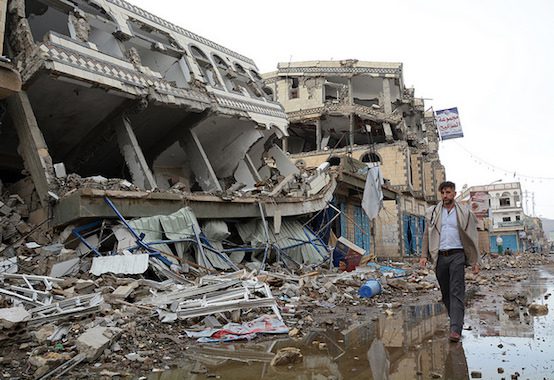U.S. Support for the Disgraceful War on Yemen Must End

The New York Times denounces the Saudi-led coalition’s starvation of Yemen:
Impeding humanitarian assistance and using famine as a weapon are war crimes, and Saudi Arabia must realize that the world is finally taking notice.
There has been increased international scrutiny and criticism of the coalition’s war and blockade in the last few weeks, and that is of course always welcome and very long overdue. If suffering from the world’s worst famine and cholera crises hasn’t yet made Yemen a top priority, the tightening of the Saudi-led blockade has caused more people to pay attention to a man-made disaster that has been consigned to the margins of media coverage and policy debate. The Saudis and their allies have been starving the country for two and a half years without having to face much criticism in the West or anywhere else, but it is possible that they have now made their criminal behavior too outrageous to ignore. But as long as they face no meaningful consequences and continue to enjoy the full support of their Western patrons, it is hard to see what changes.
Changing U.S. policy in Yemen and ending our support for the war are more critical than ever. That support helps make the coalition’s war effort possible, and it provides political cover for the governments engaged in the wrecking of Yemen. As long as the coalition can rely on continued arms sales, refueling, and diplomatic backing, they can inflict more harm on the civilian population and evade responsibility for their crimes.
Unfortunately, any change will come too late for many innocent Yemenis. Save the Children estimates that 50,000 children in Yemen will die this year from starvation and disease, and that number will go higher if conditions remain as they are. These are deaths that could and would have been prevented if not for the war and blockade, and there will be many more if the coalition is not pressured to stop its collective punishment of the civilian population. The governments that have the most influence with the leading coalition members, including ours, have the ability to apply that pressure, but to date there has been no political will to do so.
The resolution passed in the House earlier this week is a start, but members of Congress have to do much more in opposing U.S. support for the war. As Zaid Jilani explains in his report on H. Res. 599, the resolution passed by the House does not require any change to U.S. policy:
The House of Representatives on Monday voted 366-30 to declare what has long been known — that it has not authorized U.S. action in support for the Saudi-led war in Yemen, but other than urging the parties to come to a negotiated solution, the resolution did not actually do anything to end American participation in the conflict.
Acknowledging that the U.S. role in supporting the coalition is unauthorized by Congress is important, but it is also inadequate. It is telling that many of the most reliable antiwar members of the House and some of the loudest critics of the war on Yemen voted against this resolution (including the original Republican co-sponsors of H. Con. Res. 81, Walter Jones and Thomas Massie) because it does nothing to end U.S. involvement in this disgraceful war. Members of Congress need to emphasize that continued U.S. military assistance to governments that are blocking the delivery of humanitarian aid is not legal and must be suspended, and they need to stress that until that assistance is cut off the U.S. is complicit in the coalition’s crimes committed against the people of Yemen.